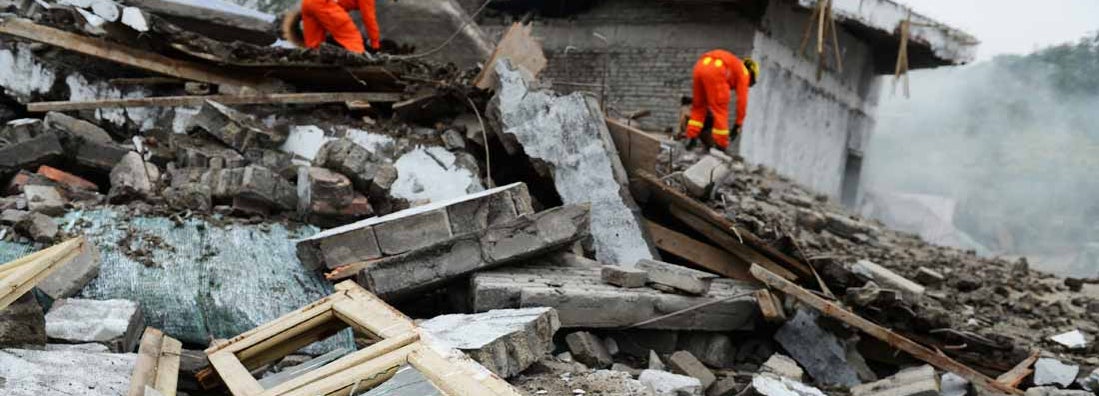Delaware Earthquake Insurance
Find the right earthquake insurance policy for you.

Although Delaware became a state long before most others, its residents experienced two earthquakes before it became the First State. Luckily, today's homes and buildings are constructed of tougher materials than settlers had available to them, but the damage that earthquakes unleash can destroy even the most durable of modern materials. Most homeowners insurance policies do not cover the damage these seismic events can cause. Only an earthquake insurance policy will protect you from costly damages.
Before you search for quotes on earthquake insurance policies, however, there are several things to keep in mind.
Use our independent agent matching system to find the best insurance plan in your area. You tell us what you’re looking for, and our technology will recommend the best agents for you. Any information you provide will be sent to only the agents you pick. We do not sell to third parties.
A History of Earthquakes in Delaware
According to the United States Geological Survey:
- October 9, 1871: In Wilmington, Delaware's largest city, chimneys toppled, windows broke, and residents were quite bewildered by the earthquake that struck. Lighter damage was sustained in northern Delaware in Newport, New Castle, and Oxford.
- A tremor in March 1879 on the Delaware River, not far from Dover, was felt "strongly" in that area, according to old seismic records.
- On May 8, 1906, just three weeks after the noted San Francisco earthquake in California, tremors were felt in Delaware. Records state that this shock was strong in Seaford, in southwest Delaware.
- Two tremors, both below intensity V, occurred in Delaware, one on the Lower Delaware in December 1937, and one near Wilmington in January 1944.
- The South Carolina quake, the strongest in Eastern U.S. history, destroyed much of Charleston in August 1886, and shook up a region from Boston and Milwaukee in the north to Bermuda and Cuba in the south.
The Amazing Power of Earthquakes
Although falling objects are a dangerous part of earthquakes and, indeed, the most common effect felt by Delaware residents, they aren't the only danger these seismic events feature.
- Earthquake damage depends on what area is hit. If an unpopulated region is struck, there will be low loss of life or property. If it hits a large city, there may be many injuries and more destruction.
- Earthquakes have the power to uproot trees and send them crashing into buildings. They can trigger landslides and avalanches, and cause flooding and tsunamis. Human structures are also at risk. It is interesting to note that tall buildings will sustain the least damage if they are located directly at the epicenter. This is because they can withstand the up-and-down motion of P-waves. S-waves, on the other hand, occur far away from the epicenter, and cause the greatest stress by shaking buildings from side to side. These buildings are often knocked off their foundations.
- Buildings with thick, heavy walls do not resist shock waves very well. Violent earthquakes often cause structures to collapse, burying people underneath. Brick buildings are the most vulnerable. Chimneys and heavy roof tiles are often shaken off during the tremors, and can crash into bystanders or passersby.
- Buildings on soft or filled-in soil suffer the most because they feel shock waves most directly. Buildings on bedrock suffer less damage because the ground is firmer.
- The shaking of the earth is sometimes not the greatest disaster. It is often in the ensuing fires and floods where the greatest damage occurs. In the 1906 earthquake, it was the subsequent fires that caused the majority of damage. An earthquake can also destroy dams high above a city or valley, causing floods to sweep down and sweep away everything in their path.
- A 60-second or less earthquake can cause devastation that continues for years after the first tremor.
What Is Earthquake Insurance?
Earthquake insurance is added protection that you can purchase as a rider to your traditional homeowners insurance policy. It is a form of property insurance that pays the policyholder in the event that an earthquake causes damage. Most ordinary homeowners insurance policies do not cover earthquake loss.
What Does Earthquake Insurance Cover?
Interestingly enough, earthquake insurance covers more than just damage caused by the ground shaking. That's because earthquakes can lead to other catastrophic events such as mudslides, tsunamis, floods, fires and more. This coverage usually comes with a high deductible, but will provide substantial coverage in the event that your home is destroyed as a result of a significant seismic event. Earthquake insurance includes coverage for damage to the foundation or basement, the overall structure of the home, and damage to the interior of the home.
However, the coverage offered by different Delaware insurance providers may vary. Some policies will cover accessory structures such as garages, while others cover damage only to the home. Also, some of the more comprehensive plans will provide coverage for personal belongings in your home. Always discuss your coverage options with an experienced insurance agent.
What Should I Do During an Earthquake?
Fortunately, Delaware isn't directly above a fault line and, therefore, warning systems in place should alert you to the dangers of an impending quake. If you are indoors during an earthquake, stay low to the ground away from large objects that may break or fall on you. Do not use elevators or attempt to leave the building, as this is the most common cause of injuries during earthquakes. Brace yourself until the shaking stops.
If you find yourself covered in debris, cover your nose and mouth with a cloth or handkerchief. Do not light a match. Fires are common hazards following earthquakes. Search for and extinguish any flames before they are out of control. If you smell gas or any strong chemical odors, leave the area immediately.
How Much Will My Earthquake Insurance Quote Be?
The earthquake insurance quotes you receive may seem expensive at first, but because your home is more than likely your biggest investment, protection from natural disasters is necessary. Homes that are located directly over or near known fault lines, such as those in Delaware, have the highest risk of damage, and policies for these homeowners often come with high premiums. There are, however, ways that these homeowners can reduce their costs.
Homes that are made of wood generally cost less to insure than those made of brick. This is because wood-constructed homes are more flexible and can better withstand the jarring motions caused by an earthquake. Older homes are at higher risk of damage due to earthquakes and may be quoted a higher price to insure. Homeowners can often receive lower premiums by retrofitting their homes to make them better able to withstand an earthquake. This can be done by securing the structure to the foundation and installing a sprinkler system in the home.
How Can I Find Earthquake Insurance?
When disaster strikes, the last thing you want to worry about is whether the damage happening around you is covered under your homeowners insurance policy. Finding the right earthquake protection is important.
Knowledgeable, independent insurance agents on the Trusted Choice® network are always here to help answer any questions you may have about earthquake insurance, suggest coverage options, and even help you file a claim. Their years of experience working with Delaware insurance providers enables them to locate a number of policy quotes from a variety of companies, ensuring the quotes you receive are at competitive rates. Contact a Trusted Choice agent in your area to find out how you can be protected against earthquakes.
